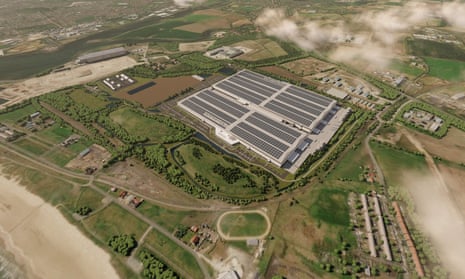The Guardian view on Britain’s electric vehicle industry: slow-motion car crash
The struggles of a flagship battery manufacturer point to a wider malaise

Earlier this year Boris Johnson predicted that a planned £3.8bn gigafactory in Blyth, built by a startup company called Britishvolt, would soon be “at the helm of a global green industrial revolution”. As with so many of Mr Johnson’s boosterish claims regarding Britain’s journey to net zero, facts on the ground have signally failed to keep pace with sunny rhetoric. Britishvolt’s vast site on the north-east coast remains a muddy field. This month, having failed to persuade the new business secretary, Grant Shapps, to ease its cashflow problems, the company finds itself more or less broke and up for sale.
To put this depressing story in its proper perspective, it has been estimated that 41 gigafactories are either operational or planned in western Europe, compared with just three in Britain (and that’s if Britishvolt is optimistically included). Governments in Germany, France and elsewhere have spent billions of euros to attract leading battery manufacturers, who will be fundamental to 21st-century car production. The strategic logic at work is not difficult to grasp: in the future, manufacturers will be based where access to batteries is local and straightforward; a fully functioning domestic supply chain will also be safeguarded from external shocks, and generate jobs to compensate for those lost in the transition away from petrol and diesel.
A vision of this joined-up future can be glimpsed in Sweden, where Northvolt – a state-backed battery startup that has become one of Europe’s biggest manufacturers – has partnered with Volvo, Volkswagen and BMW. But a similarly proactive industrial strategy appears to be beyond the present government. Plans are in place for a new gigafactory serving Nissan in Sunderland, but Britain needs up to seven more by 2030. The funding support on offer from Whitehall has been woefully inadequate, as successive ministers have sat on their hands.
This laissez-faire immobilism has become an existential threat to the future of the domestic car industry. Tata Group of India, which owns the UK’s leading car manufacturer, Jaguar Land Rover, is believed to be mulling a rescue bid for Britishvolt, but has reportedly been put off so far by the lack of government backing. There are fears that without good reasons to focus on Britain, Jaguar Land Rover may shift future car production to its plant in Slovakia. Meanwhile, there are other signs that a tipping point is approaching. BMW is transferring production of its Mini EVs to China. The UK electric van startup Arrival is decamping to the US, where it can take advantage of new financial incentives offered by the Biden administration.
Britishvolt, a three-year-old startup with no existing product and no carmaker on board, should never have been talked up so extravagantly by Mr Johnson in the first place. Nevertheless, the company’s “red wall” location symbolised hopes that the energy transition – however challenging – could be the catalyst for an economic renaissance in our post-industrial regions. That is a prize worth fighting for. But as investment decisions are taken which will determine the shape of the global car industry for decades to come, its rise and fall illustrates that the government is simply failing to do its job.
For the situation to be turned around, carmakers and the biggest battery companies need to see a coherent industrial strategy in place – one in which the state has skin in the game and offers serious incentives to invest. This is all the more vital given continuing Brexit headwinds and endless political upheaval. Before it is too late, Mr Shapps must recognise the looming car crash in the country’s flagship manufacturing industry and take belated action to avert it.